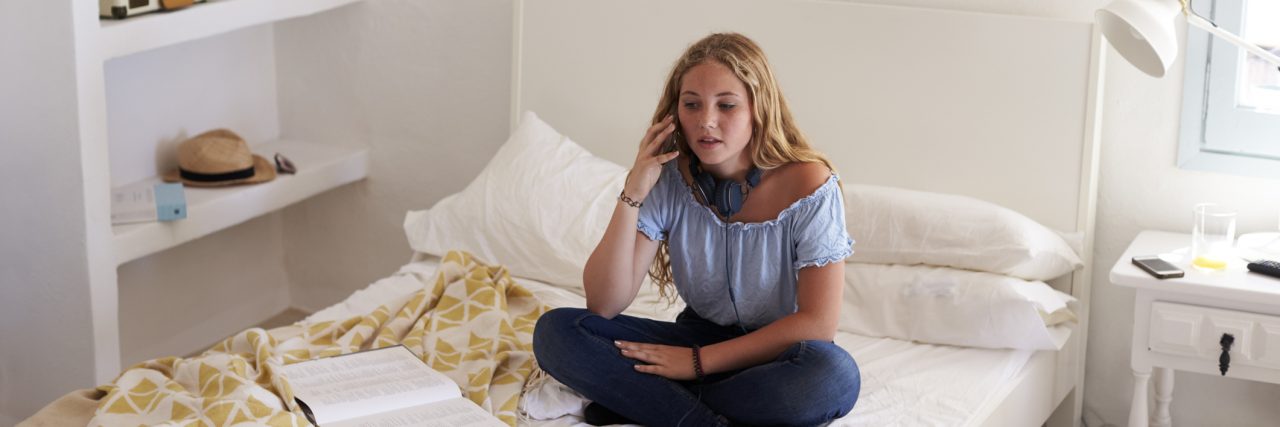I can always remember my legs aching and being tired from a young age. I just thought it was normal. It wasn’t until I was 15 that I had my first dislocation of the knee. The orthopedic consultant said it was due to my age and that it was quite common for girls going through puberty to have dislocations.
• What is Ehlers-Danlos Syndrome?
• What Are Common Ehlers-Danlos Syndrome Symptoms?
Two years later my knee dislocated again. After an MRI scan, the orthopedic consultant said I’d need a tibial tubercle osteotomy because my knee cap was too high and not gliding in a the way it should. I had my other knee operated on a few years later after another dislocation and subluxations.
When I had my first knee operation I caught glandular fever. Over the next few years my fatigue levels kept deteriorating, and I found I was getting a lot of pain in a variety of joints. Initially I thought it was due to the glandular fever. I’ve heard many people say it’s taken them years to get back to themselves; that didn’t happen for me.
In 2012 I decided I’d go to my general practitioner to talk about my symptoms. She said she would do various blood tests to see if she could find what was going on. My blood did show I had borderline hypothyroidism, and the GP said I needed to take Levothyroxine. I asked if anything else showed on the results, and she said, “No.” That was all she said, and she sent me on my way.
I left feeling like more could’ve been done and that the thyroid problem wasn’t all that was wrong.
Now, there’s the whole cliché about Googling your symptoms, but I felt so at a loss so that is what a did. The various physiotherapists I’d seen over the years had all said I was very hypermobile, so imagine my surprise when I Googled my symptoms and found something called hypermobility syndrome! My symptoms matched in almost every way! I printed off the information I found and highlighted everything that related to me. I knew I would probably be presented with some hostility when I showed the GP my findings so I also looked up to find where the various hypermobility clinics were.
Armed with my printouts, I went to see the GP again. I wasn’t wrong in my expectations. She requested I do the Brighton Test (the test for general joint hypermobility) and agreed I was hypermobile. “What do you want me to do?” she asked me. “A rheumatologist won’t see you because you have no inflammatory markers.” (I’ve since learned this is not true, and rheumatologist do deal with hypermobility syndrome patients.). I told her I found a clinic not far from our city that specializes in joint hypermobility. “OK. Well I’ll find out if they will see you, but they might not,” she replied.
A couple of months later a letter dropped through my letterbox. It was for the hypermobility clinic I’d mentioned. The appointment was for my birthday, but I wasn’t worried. I had some relief that something was being done.
So, on my birthday in 2012, I was diagnosed with hypermobility syndrome.
Fast forward to 2016, and I was diagnosed with Ehlers-Danlos syndrome – hypermobility type by a specialist privately in London.
Ehlers-Danlos syndrome is a genetic connective tissue disorder which causes your body to produce faulty collagen. This means that, not only can my joints be affected but so can the rest of my body. So a diagnosis is very much needed.
If it wasn’t for my own research, I could still be stuck without a diagnosis.
Unfortunately, I am still struggling to get help when I need it from my GPs, and, even though I’ve got a diagnosis, I still sometimes get treated like it’s “all in my head.” I’ve had a few different battles trying to get the help I need since my diagnosis, but if I don’t fight for my health, who will?
To the GP I visited back in 2012 who doubted my symptoms (and, indeed, every doctor), be kind and sympathetic. Listen to us. We know our bodies and know when something isn’t right. Don’t be afraid to say you don’t understand or know what the problem is. Help us. Send us to someone who would know. It’s hard enough feeling unwell, let alone having to battle for help and care.
To anyone who feels like they are battling for the help they need, keep fighting! Know you aren’t alone in your battle. So many others, like me (even with a diagnosis), are battling to be heard too. We will get the help we need and the care we deserve!
Thinkstock photo by monkeybusinessimages

